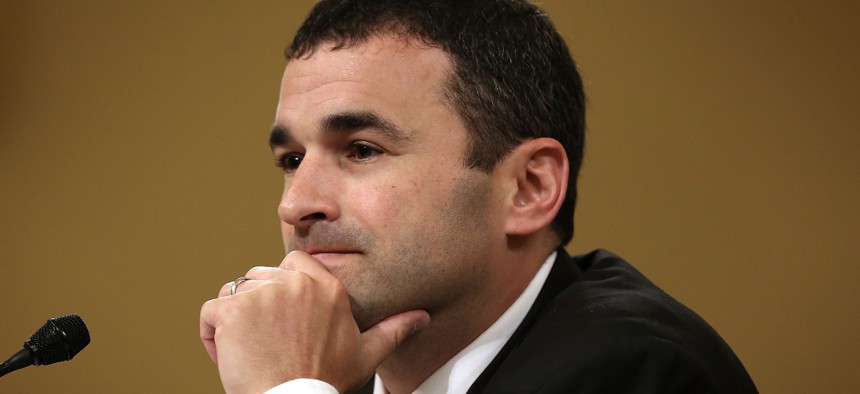
Danny Werfel, shown here testifying during a hearing before the House Ways and Means Committee on June 27, 2013. Werfel has served in administrations of both parties, including as controller of the Office of Management and Budget. Alex Wong/Getty Image
Biden Taps Federal Management Guru to Lead IRS
Nominee previously led the tax agency and has ideas on implementing its unprecedented cash infusion.
President Biden on Thursday announced he will nominate Danny Werfel as the next Internal Revenue Service Commissioner, tapping a long-time public servant who briefly led the tax agency under President Obama.
Werfel has served in administrations of both parties, including as controller of the Office of Management and Budget. He previously led IRS in 2013 amid a scandal in which the agency was found to have been targeting certain political groups for additional scrutiny of their tax-exempt status. He has won bipartisan plaudits for his time in government and has spent the last nine years at the Boston Consulting Group in its public sector practice. Charles Rettig, the most recent confirmed commissioner who was appointed by President Trump, stepped down from the post last month as his term was about to expire.
“Werfel provided immediate stability to the IRS, effectively responding to numerous congressional investigations, successfully launching the Affordable Care Act technology that IRS was responsible for, and navigated the IRS through a multi-week government shutdown,” the White House said in a statement announcing the appointment.
In a recent interview with Government Executive, Werfel laid out the challenges facing IRS as it seeks to implement the Inflation Reduction Act and the $80 billion it will provide to the agency over the next 10 years. He boasted that for every dollar Congress appropriates to IRS, it brings back far greater returns. He praised the IRS workforce and said it was aware of, but undeterred by, their less-than-stellar approval ratings.
“People wear their unpopularity with a badge of honor,” Wefel said, knowing their role is “important for a functioning society.”
Werfel noted IRS will face challenges in implementing Biden’s signature tax, climate and health bill, particularly with regard to meeting its goal to hire tens of thousands of new employees. The agency will face a tough hiring environment, he said, with labor shortages creating a battle for talent between the public and private sector. He added IRS will have to get prospective applicants excited about government service generally and the IRS mission specifically, calling on agency recruiters to stress that virtually every public service the government offers is funded through the tax system. While it will not be easy, particularly in the current hyper-politicized moment, he said IRS should tap into Americans' sense of patriotism.
The agency has already hired 4,000 customer service employees since the Inflation Reduction Act became law in August.
Initially, the Inflation Reduction Act included special hiring and pay authorities to allow IRS to quickly recruit and onboard new employees. Due to arcane Senate procedures, however, that language was stripped from the bill before it passed and President Biden signed it into law. Analysts at the Congressional Budget Office found it could have a dramatic impact: they lowered their projection of the new revenue IRS would bring in over the next 10 years by $23 billion. The reason, CBO said, was the law no longer containing personnel flexibilities “will cause the IRS to hire new personnel more slowly and could make hiring experienced candidates more difficult.”
The agency maintained temporary direct hire authority—which allows agencies to bypass many of the hurdles that typically slow down the hiring process—after it received special permission for some positions from the Office of Personnel Management.
Werfel, who in addition to acting IRS commissioner has served in multiple leadership roles at OMB, said previous efforts to hire at the tax agency have been coupled with pay and hiring flexibilities.
“It was a really really important tool,” Werfel said, attributing to it “a lot of the successes IRS had in its modernization journey.” He added IRS is in need of major technological upgrades and “a lot of tech firms and other private sector companies will be able to pay more than the IRS.”
Werfel stressed that IRS will also have to rebuild its internal systems to support the hiring surge after years of shedding staff. He said that will require restoring the human resources shop to boost recruiting, processing of job applications, screening of candidates, conducting interviews and coordinating with other parts of the government to process background checks.
“You’re scaling a significant amount due to the intent of the Inflation Reduction Act,” Werfel said.
In the wake of the IRA's passage, conservative lawmakers and others have heaped criticism on IRS and said the building out of the agency represents a threat to Americans. Subsequent threats against IRS employees led the agency to launch a comprehensive review of the agency's safety measures. Werfel said the agency must stress its enforcement is not about an "aggressive approach with weapons," but rather working with taxpayers to help them understand and comply with their obligations. He also said IRS leadership must work with staff to reassure them and dispel the negative rhetoric.
“We have to do a job, a job that will outlive the political narratives of the day,” Werfel said.
In a previous interview with Government Executive discussing President Biden’s leadership style, Werfel laid out what it means to be a good political leader in government.
It is vital for any appointee to “recognize that civil servants are apolitical, that they’re serving a mission, and that they are going to help you achieve your goal as long as that goal is advancing the mission,” he said.
Werfel’s nomination will now go before the Senate, where he will need a simple majority for confirmation.







